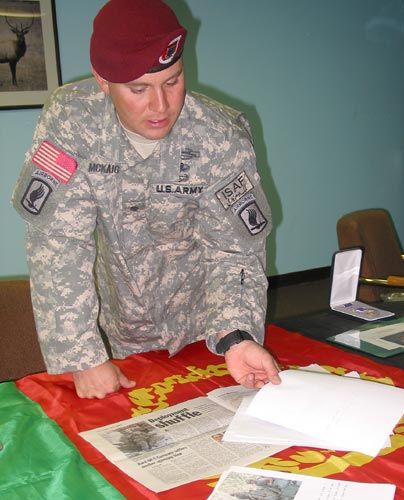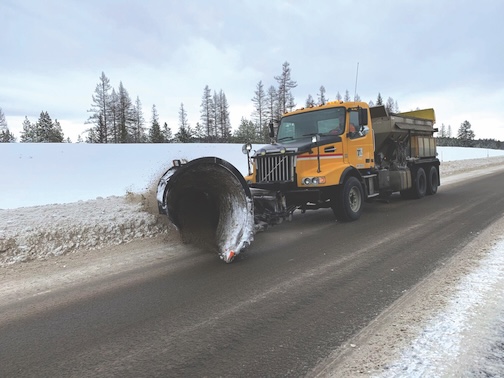Battle at Wanat
Published 11:46 am Saturday, August 30, 2008

- HISTORY IN THE MAKING: Spc Christopher McKaig, a soldier from La Grande, fought in the Battle of Wanat in Afghanistan July 13. Above, he displays a news account and photos of the fight that attracted world-wide media attention. - The Observer/TED KRAMER
The memory is nearly two months old now, but it hasn’t faded and likely won’t for a long time. Spc. Christopher McKaig, U.S. Army airborne infantryman from La Grande, can’t get the Battle of Wanat out of his mind.
Trending
He remembers fire, smoke, noise and the adrenaline rush that helped him stay alive and go on fighting. He remembers fear, too, a fear like nothing he’d experienced before, a feeling he describes as “fear to the core.”
More than that, he remembers the bravery and valor of men who were battered, bloodied but never beaten in a desperate fight that made the world look anew at the conflict in Afghanistan.
“I want people to know they should be proud of those guys. They fought from their hearts and I’m proud to be part of them,” said McKaig, who is home on leave following a rigorous tour of duty.
Trending
McKaig, 34, grew up in New Jersey. He moved to La Grande with his parents, Pat and Irene McKaig, in 1991.
His mother and father eventually moved back East, but he continues to call La Grande home. He figures he always will.
“It’s where I’m planning to retire if I get through my career,” he said.
He graduated from La Grande High School in 1992, joined the Army soon after. He trained as an airborne infantryman at Fort Benning, Ga., and also went to the Army’s Air Assault School at Fort Stewart, Ga.
He was discharged in 1996, but later decided to go back. In June 2007, he signed up for another hitch.
By December 2007, he was assigned to Company C, 2nd Battalion, 503rd Infantry Regiment, 173rd Airborne Brigade, stationed
in Vicenza, Italy. In April of this year, he shipped to Afghanistan as a replacement.
He was one of a small group Second Platoon soldiers manning an observation post (OP) at Wanat, in the far eastern province of Nuristan, the fateful day of July 13.
The OP, situated a short distance from a newly-established forward operating base, was among targets hit in the early morning hours by a surprisingly well-trained and well-organized militant force.
Before the battle was over, nine U.S. soldiers, including seven in the OP, were dead. At least 40 militants fell also.
The ferocious fight made headlines around the world, with some media reports claiming that the Americans and their Afghanistan National Army allies had been over-run.
McKaig, like others who were there, says that isn’t so. True, the wire was breached, but “over-run” is too strong a term.
“The mainstream media had that wrong. We weren’t over-run, but it was extremely close,” McKaig said. “Everybody fought so hard. It was the most horrible but also the most amazing experience.”
McKaig’s unit had been in the Wanat area only three days when the attack occurred.
Before that, there had been many patrols through hostile territory, and plenty of fights. Rarely if ever, though, had the unit encountered a large, organized and well-trained force.
“Usually we get hit by five to 12 of them, and typically they hit and run. They try to weather us down,” he said.
The American outpost then being set up was situated close to Wanat, an impoverished village surrounded on all sides by steep hills.
The area around the village, along the Pakistan border, is hotly contested, with American and Afghan National Army elements constantly contending with Taliban and al-Qaida militants.
A different kind of action took place at Wanat on July 13, as an estimated 200 militants, described in most accounts as Taliban, took the high ground in the dead of night and launched an orchestrated attack with small arms, machine guns and rocket-propelled grenades.
“They were in position. It was well-coordinated and they knew what they were doing,” said McKaig. “We were down in the bottom of a fishbowl. For them it was like shooting fish in a barrel.”
McKaig said his platoon woke up and stood to at 3:30 a.m. that day. Nothing seemed amiss, but about an hour later, fire erupted from every direction.
The enemy was all around, concealed in trees, in mud huts, in a bazaar shop and a two-story hotel in the village. Surprise was complete.
“Suddenly explosions and small arms fire were coming from everywhere. They just sprang a trap,” McKaig said.
The platoon fought back. McKaig, who was armed with an M-4 carbine, recalls firing off seven magazines – 210 rounds – in 20 minutes. His weapon eventually became too hot to fire.
Other soldiers encountered similar problems. Machine guns pouring out thousands of bullets overheated and malfunctioned. Added to that problem, ammunition started running low.
McKaig said four or five solders were killed in the initial attack. Others were wounded. Shrapnel penetrated McKaig’s backpack, perforating its contents. One chunk hit him in a finger.
Over the course of the battle, McKaig also suffered a burn on his arm from an RPG, and injured a knee. He was later awarded the Purple Heart.
As the battle raged on and casualties mounted, McKaig and Cpl. Jonathan Ayers manned a fighting position together. They fired a machine gun and tossed grenades, drawing heavy fire in return.
The enemy tried a trick to dislodge them, McKaig said.
“They threw rocks at us, hoping we’d think they were grenades and jump out,” he said.
The trick didn’t work. Both men stayed put and repeatedly raised up over the sandbags to fire the gun and toss grenades.
After four or five times, Ayers’ luck ran out.
“He got hit with an armor-piercing bullet. He hunched over the gun and looked at me, but I knew he was dead,” McKaig said.
McKaig said that at other times during the battle, he detonated Claymore mines that had been set in the wire, and also managed to get a round off from a shoulder-fired rocket launcher.
“I aimed once at a spot and it didn’t go off. The second time I aimed in the same spot and it fired. I hit that place dead center, and said ‘Wow!’ “
McKaig joined his platoon sergeant, Sgt. Matthew Gobble, and Spc. Tyler Stafford, in another fighting position. Both men had been been fighting hard, and both were wounded.
“Gobble was hit in the leg and crotch, and Stafford was hit all over,” McKaig said. “I put a dressing on a wound on Stafford’s leg.”
The three men assessed the battle situation and decided that someone had to go for more ammo. McKaig was the only one able to take on the mission.
“I dove out and zig-zagged all the way down to main area, which was getting hammered,” McKaig said.
Down below, a squad was forming to go to the rescue of the men at the OP. Lt. Jonathan Bostrum led that group back up the hill.
McKaig went with them, packing hand grenades and ammunition. In subsequent fighting, Bostrum was killed. Gobble and Stafford made it out of the OP alive.
The battle lasted about two hours and was resolved for good with the arrival of air support.
Coalition soldiers popped smoke, marking their own positions. Bombs, missiles and rockets hit the places where there was no smoke. The militants decided to pull back.
First Platoon of C Company, which was based several miles away, rolled up in Humvees and also helped chase the enemy, McKaig said.
“Those guys came in fast and laid down some serious fire,” he said.
In addition to the nine American dead, 15 were wounded. McKaig was among soldiers airlifted to Bagram for treatment of injuries.
“I feel lucky to be alive and lucky to have been a part of this, as horrible as it was,” he said.
McKaig’s unit has since rotated out of Afghanistan, returning to its home station in Vicenza.
McKaig is on leave and staying with friends until Sept. 9, when he heads back for Italy to prepare for another combat tour.
The La Grande soldier said he is happy to be home for a while, but also looks forward to seeing his buddies again.
He said he is proud of his unit, its distinguished service in past conflicts and its reputation for aggressiveness in the war on terror.
“We know we’re elite and we try to live up to our ancestors’ reputation,” he said.
He also said he hopes people on the home front understand the importance of the mission in Afghanistan, and the depth of the sacrifices young Americans are making there.
“I want the American people to know what’s happening in Afghanistan. There’s definitely a war being fought there and history being made,” he said.









